i'm looking for any images out and about of an actual surviving klappvisor bascinet? I have seen several replicas, but not an actual piece in a museum. can anyone help
[ Linked Image ]
Spotlight: The 14th Century Bascinet
An article by Alexi Goranov
And, the forum search function is your friend:
A Bascinet with Hinged Visor, Circa 1400-10
Bascinet klappviser
... among others.
Spotlight: The 14th Century Bascinet
An article by Alexi Goranov
And, the forum search function is your friend:
A Bascinet with Hinged Visor, Circa 1400-10
Bascinet klappviser
... among others.
Here's a couple from the auction houses. I can't remember where the first one came from, the second one looks like a Hermann-Historica.
 Attachment: 177.59 KB
Attachment: 177.59 KB
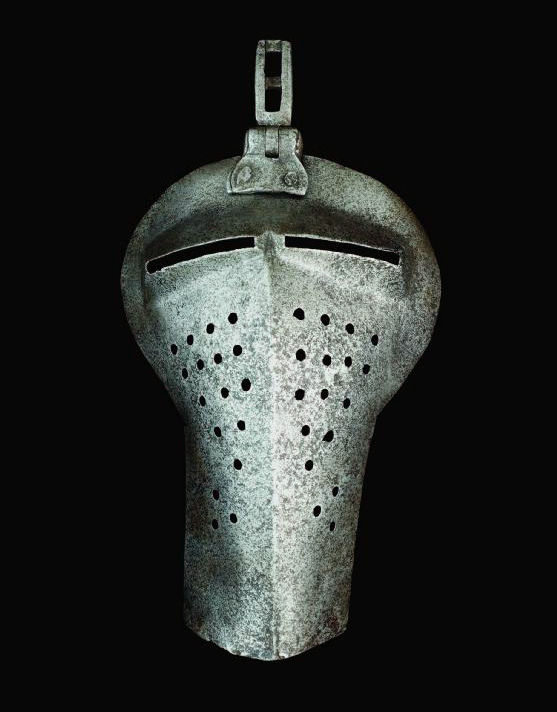
Italian ca.1350
 Attachment: 127.79 KB
Attachment: 127.79 KB
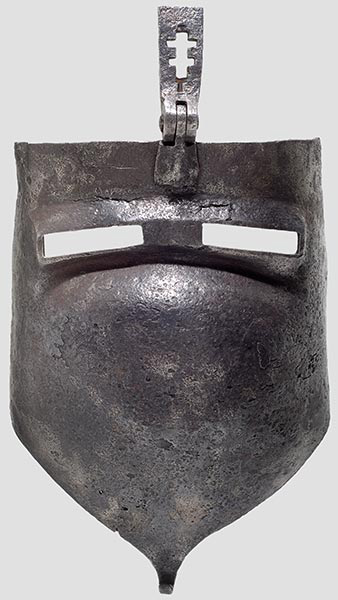
German ca.1350-1400
 Attachment: 116.91 KB
Attachment: 116.91 KB
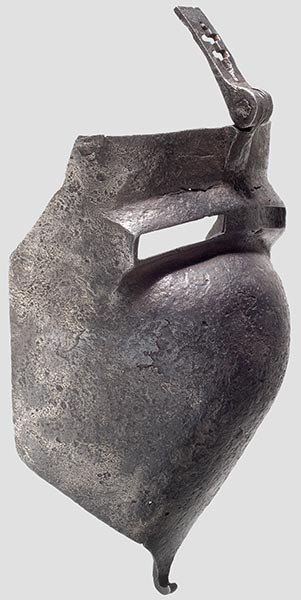
German ca.1350-1400

Italian ca.1350

German ca.1350-1400

German ca.1350-1400
excellent, I think its hockey time eh! but really thank you, my search fu must be weak. i just wanted to see some actual examples before purchasing my own.
anyone have any feed back on klappvisor vs houndskull. it would seem that the angles on a houndskull would create better deflection vs thrusts, but i like the look of a klappvisor. Any feed back from those who have used them in the field?
anyone have any feed back on klappvisor vs houndskull. it would seem that the angles on a houndskull would create better deflection vs thrusts, but i like the look of a klappvisor. Any feed back from those who have used them in the field?
| Eric Fick wrote: |
| anyone have any feed back on klappvisor vs houndskull. it would seem that the angles on a houndskull would create better deflection vs thrusts, but i like the look of a klappvisor. |
With bascinets, you have two main types of visor shape: snouted (often called houndskull) and rounded. How they are attached the helm is either with side pivots or with a central hinge (klappvisier). You can have a snouted visor attached via a central hinge and our article shows an example of that.
There is a misconception that snouted helms were all side pivot and rounded were all klappvisier. That's not the case. :)
thank you both for the pics and Chad for the info regarding the misconception (of which i was a victim)
Hei Eric,
I have some pictures, but I don`t know where they from.
I hope this photo will help.
Thank you.
 Attachment: 141.52 KB
Attachment: 141.52 KB
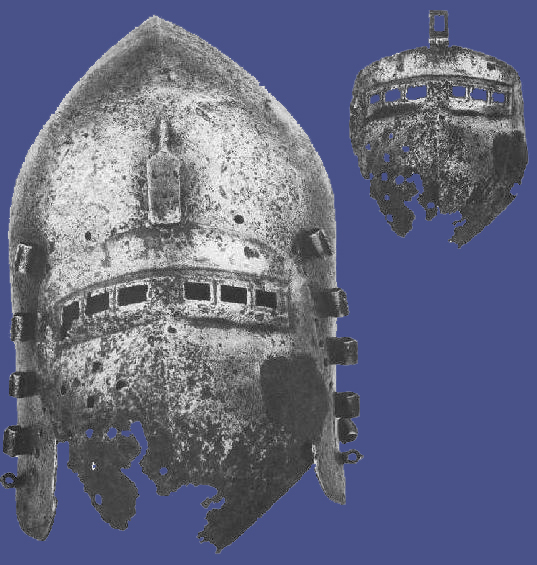
 Attachment: 138.72 KB
Attachment: 138.72 KB
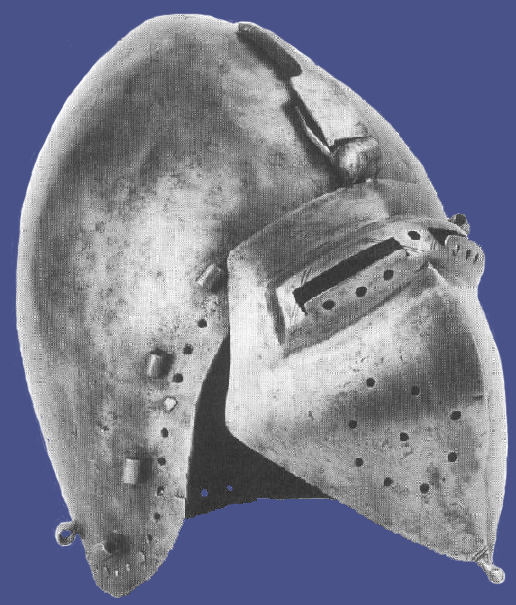
 Attachment: 161.92 KB
Attachment: 161.92 KB
[ Download ]
I have some pictures, but I don`t know where they from.
I hope this photo will help.
Thank you.


[ Download ]
good deal!
one thing that has come to my attention, and maybe i missed something but i dont see any means of securing the face plate to the helm, no holes for straps or pins or hooks. However, most of the replicas I see have some form of belt going around the helm, is this correct? or does the face plate simply hang in place with nothing but gravity keeping it in place? for some reason i think the later to be true
thoughts
one thing that has come to my attention, and maybe i missed something but i dont see any means of securing the face plate to the helm, no holes for straps or pins or hooks. However, most of the replicas I see have some form of belt going around the helm, is this correct? or does the face plate simply hang in place with nothing but gravity keeping it in place? for some reason i think the later to be true
thoughts
Sorry to raise this topic from the grave, but Eric posted an interesting question above:
I also would like to know the difference between houndskull versus flat-faced/shovel-faced bascinets in combat (be it SCA or WMA). Especially with regards to visibility. I have tried on a few houndskull bascinets in a shop and the visibility wasn't what I hoped for. When looking at an opponent at normal fighting distance (2-3 paces) I could see them from the top to just below the chest. But I need to add that those bascinets didn't fit me that well. One was too big, the other too small (so it was probably sitting too high).
| Eric Fick wrote: |
| anyone have any feed back on klappvisor vs houndskull. it would seem that the angles on a houndskull would create better deflection vs thrusts, but i like the look of a klappvisor. Any feed back from those who have used them in the field? |
I also would like to know the difference between houndskull versus flat-faced/shovel-faced bascinets in combat (be it SCA or WMA). Especially with regards to visibility. I have tried on a few houndskull bascinets in a shop and the visibility wasn't what I hoped for. When looking at an opponent at normal fighting distance (2-3 paces) I could see them from the top to just below the chest. But I need to add that those bascinets didn't fit me that well. One was too big, the other too small (so it was probably sitting too high).
| Eric Fick wrote: |
| good deal!
one thing that has come to my attention, and maybe i missed something but i dont see any means of securing the face plate to the helm, no holes for straps or pins or hooks. However, most of the replicas I see have some form of belt going around the helm, is this correct? or does the face plate simply hang in place with nothing but gravity keeping it in place? for some reason i think the later to be true thoughts |
On many reproductions, you'll see a strap likely because the user is required to have one (for example, SCA combat rules require one - and many WMA/LH folks use one when fighting because it is safer than having a visor that is more or less free to move). In reality, they probably didn't have a strap. Friction in the hinge and gravity were probably the only things keeping it down.
| Sander Marechal wrote: | ||
Sorry to raise this topic from the grave, but Eric posted an interesting question above:
I also would like to know the difference between houndskull versus flat-faced/shovel-faced bascinets in combat (be it SCA or WMA). Especially with regards to visibility. I have tried on a few houndskull bascinets in a shop and the visibility wasn't what I hoped for. When looking at an opponent at normal fighting distance (2-3 paces) I could see them from the top to just below the chest. But I need to add that those bascinets didn't fit me that well. One was too big, the other too small (so it was probably sitting too high). |
I've never worn a shovel face, but I'd imagine the visibility wouldn't be all that much better than the houndskull style visors - which is roughly what you had, maybe going so low as the waist. The reason would be that you'd still want a bit of space between your face and the visor. In armoured combat, if you aren't using a long weapon (spear, for example), you often have to rely on feeling what your opponent is doing rather than seeing it. In situations like SCA heavy combat, where many historical armoured combat actions (I believe there is no form of grappling allowed, and halfswording is rare if it is even allowed) are not allowed, folks often will have larger eyeslots (or bargrills) on their helmets to facilitate visibility at closer ranges.
Raising the visor is also another option for better visibility. Neither in my Klappvisier Basinet, or in the houndskull one do I haver good range of vision. The eyeslots are below 1cm in size. I would prefer raising the visor in combat. The basinets have a face enclosing aventail because of this, leaving only a face surface of about a hands palm free of armour.
| Felix R. wrote: |
| Raising the visor is also another option for better visibility. Neither in my Klappvisier Basinet, or in the houndskull one do I haver good range of vision. The eyeslots are below 1cm in size. I would prefer raising the visor in combat. The basinets have a face enclosing aventail because of this, leaving only a face surface of about a hands palm free of armour. |
a point I missed Felix, thanks. We have ample evidence to show that it was common (or certainly that it wasn't uncommon) to raise one's visor once things got in close or even in some cases to just wear an open face helmet. And after doing a fair number of bouts in a visored helmet, it is no small wonder... visibility and breathing improve greatly, but at the cost of exposing your face.
| Quote: |
| I've never worn a shovel face, but I'd imagine the visibility wouldn't be all that much better than the houndskull style visors |
My gut feeling is that visibility should be somewhat better. I think the slits are a little closer to the eyes on a shovel face. Also, you look at them straight on instead of at an angle. So, given the same size of eye slots the shovel face should have better visibility. This is assuming that the houndskull is one of the later types that are entirely conical and not a shovel face with a beak on it.
But I really have no idea how that works out in practice, which is why I asked :-)
| Quote: |
| We have ample evidence to show that it was common (or certainly that it wasn't uncommon) to raise one's visor once things got in close or even in some cases to just wear an open face helmet. |
Good point, but it kind of defeats the point of why I would want a closed helmet. I'm contemplating going for a shovel-face klappvisor. I can use it without visor during training and with visor during free sparring and re-enactment (with steel blunts).
| David E. Farrell wrote: | ||
a point I missed Felix, thanks. We have ample evidence to show that it was common (or certainly that it wasn't uncommon) to raise one's visor once things got in close or even in some cases to just wear an open face helmet. And after doing a fair number of bouts in a visored helmet, it is no small wonder... visibility and breathing improve greatly, but at the cost of exposing your face. |
Also many of the visors have removable pins so that the visor can be removed completely: Raising the visor does allow for getting a better look at what is going on and getting some much needed air but raised it does sort of unbalances the helm and getting a hard hit on the raised visor must have been " disturbing " in various ways ;) :?:
If not positively locked in the raised position I would also imagine that it might easily drop back down if hit or even if one was walking or jumping on uneven terrain: Some visors hold their position due only to friction or a a wedging effect when raised ?
I don't know how common or varied would have been catches holding a visor locked in the open or closed position ?
| Jean Thibodeau wrote: | ||||
Also many of the visors have removable pins so that the visor can be removed completely: Raising the visor does allow for getting a better look at what is going on and getting some much needed air but raised it does sort of unbalances the helm and getting a hard hit on the raised visor must have been " disturbing " in various ways ;) :?: If not positively locked in the raised position I would also imagine that it might easily drop back down if hit or even if one was walking or jumping on uneven terrain: Some visors hold their position due only to friction or a a wedging effect when raised ? I don't know how common or varied would have been catches holding a visor locked in the open or closed position ? |
You want to have the visor closed during the initial charge. After that I doubt you would be able to take out those pins to get the visor of. In this the Klappvisier is much easier, it doesn´t have the same mass - so it stays up better and won´t have so much negativve influence on the balance - and it is easily detachable with one armoured hand. For the catch, I might remember from earlier discussions, that there is no evidence for catches on basinets on a regular basis. On side picoted visors the pivot points are behind the widest part of the helmet, so there is alot of friction in both the open and closed position. This detail is not usualy found in nowadays basinet reproductions.
| Felix R. wrote: |
|
You want to have the visor closed during the initial charge. After that I doubt you would be able to take out those pins to get the visor of. |
Yes I agree the removing of the pins to remove the visor from the helm would not normally be a battlefield option and one would have to decide before the engagement to wear the Bascinet without it's visor.
I guess with a squire or page one could have removed the pins during a lull in a long battle or have the squire or page put the visor back on ?
The pins do give the option of going into battle with or without the visor on the helm.
In an earlier period one would use the Great Helm, and if one needed more visibility or air, one would take it of and rely on a Cervelière under the Great Helm to get the same effect as removing the visor from the Bascinet. ( Different equipment but the general idea being the same ...... the visor when on the Bascinet is sort of a compromise where one has the advantages of the face protection of the Great Helm versus the open face of the Cervelière but can quickly go from protected to open quickly ).
Page 1 of 1
You cannot post new topics in this forumYou cannot reply to topics in this forum
You cannot edit your posts in this forum
You cannot delete your posts in this forum
You cannot vote in polls in this forum
You cannot attach files in this forum
You can download files in this forum
All contents © Copyright 2003-2006 myArmoury.com — All rights reserved
Discussion forums powered by phpBB © The phpBB Group
Switch to the Full-featured Version of the forum
Discussion forums powered by phpBB © The phpBB Group
Switch to the Full-featured Version of the forum

